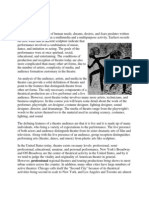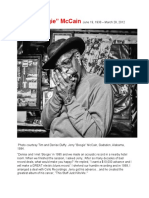Don't Start Me Talkin': Chris Smith
Don't Start Me Talkin': Chris Smith
Uploaded by
Gaurav DharCopyright:
Available Formats
Don't Start Me Talkin': Chris Smith
Don't Start Me Talkin': Chris Smith
Uploaded by
Gaurav DharOriginal Description:
Original Title
Copyright
Available Formats
Share this document
Did you find this document useful?
Is this content inappropriate?
Copyright:
Available Formats
Don't Start Me Talkin': Chris Smith
Don't Start Me Talkin': Chris Smith
Uploaded by
Gaurav DharCopyright:
Available Formats
Don't Start Me Talkin'
Chris Smith Sharing his memories of the two Sonny Boy Williamsons with the readers of 'Living Blues', Willie Dixon couldn't resist supplying a tidy conclusion to Rice Miller's life: 'And here's something: the same day Sonny Boy died, his citizenship came through in London, England.' It didn't, but Dixon's desire to have all the loose ends accounted for says something about Sonny Boy Williamson. It's because he was a great musician and lyricist that we deem it important to establish the true facts of his life and times as far as possible. Sonny Boy was an enigmatic, ornery character, who was unwilling to be interviewed about his life, but happy to improvise on it when he was relaxed and had a few drinks in him. That doesn't mean he only peddled fantasy and fabrication; some quite surprising assertions turn out to be probably true. Bill Donoghue's ongoing research towards a biography seems likely to resolve a number of puzzles, but it's a fair bet that plenty will remain. Sonny Boy would have liked that; spreading a little confusion was his way of asserting control over his identity. As he once sang, mastering the language by mangling it: There's a whole lots of peoples is talking, but a mighty few peoples know. I don't count myself among the mighty few peoples; this tribute is one of many possible takes on the life and music of - well, of whom, exactly? Famously, he always insisted that he was the original and only Sonny Boy Williamson, and that John Lee Williamson, who made his first record in 1937, was the interloper and name-thief. His passport was made out to Sonny Boy Williams, born 7 April 1909, and his fellow blues singers knew him as Willie Williams, or Willie Miller, punningly nicknamed 'Rice' as a child. He sang that he was born in 1897 in a li'l small town, Glendora, Mississippi. Some - by no means all - of the other dates of birth he gave were 1894, 1899 and 1901, and his tombstone shows March 11 1908. In recent years, most researchers have accepted that his real name was Alex or Aleck Ford, born on 5 December 1897 to Millie Ford, who later married Jim Miller. Thanks to a hard life and a mouthful of decayed and missing teeth, he certainly appeared to be in his sixties - at least - by the time he visited Europe in 1963. Recent research into census records, by David Evans on behalf of Bill Donoghue, suggests that the story may be quite different. Sonny Boy's sisters, Julia and Mary, said firmly to Donoghue that the only musician in the family was their baby brother, Alex, and the first time Alex Miller turns up is in the 1920 census records, aged seven. That would entail a birth date of 1912. There are difficulties - of course! - with this chronology, but it seems quite possible. Someone told Mike Leadbitter that Sonny Boy left home after a violent row with his stepfather 'at the age of thirty,' which seems late to be still living with one's parents. Presumably Mike, who accepted the 1897 birthdate, was told that the bustup happened in 1927. A rupture in adolescence is surely more plausible, and his reported move into blues, and away from Christian songs, might have been a similar act of teenage rebellion. Sonny Boy's confirmed musical associates were mostly from the teens and twenties of this century. His occasional guitar playing was very similar to Robert Johnson's, and of the few recorded songs which he acquired from others, both 'Steady Rolling Man' and 'Mister Downchild' were Johnson compositions. Finally, consider photographs of him taken in the forties with other 'King Biscuit Time' artists; does Rice Miller with his teeth intact really look 14 years older than Willie Love, 18 years older than Robert Lockwood, or 26 years older than Joe Willie Wilkins? Enough of birth legends; it's time for the life story. Until 1941, this consists mostly of reports of him wandering through Arkansas, Missouri, Mississippi and Tennessee, playing blues, pop and hillbilly numbers for loose change, and losing through gambling what he didn't spend on moonshine. At times he worked as a one-man band, playing harmonica, drums and kazoo, and calling himself 'Little
Boy Blue'. By 1936, he and Robert Lockwood were hopping freights from town to town, and making a steady living as street musicians despite the Depression. Along the way, Sonny Boy had an illegitimate son by Ardelle Baker in 1936, and was briefly married to Howlin' Wolf's sister. He also seems to have made some fairly determined attempts to record. There is some independent corroboration of his claims to have recorded - or at least auditioned - for Ralph Lembo and H.C. Speir. Bill Donoghue has found someone who remembers Sonny Boy saying in 1932 that he was about to audition for Lembo, and Honeyboy Edwards recalls that when he and Walter Horton went to Jackson at Christmas 1938, hoping to record for Speir, 'Sonny Boy showed up there, too.' As always, caution is necessary; in 1959, Williamson told George Adins that he had made his first records in 1938 for Columbia, in Dallas! (He also said, apparently straightfaced, that his biggest influence was Blind Lemon Jefferson.) When the big break came in 1941, it was through radio, not records. In that year, Sam Anderson of Helena, Arkansas was seeking artists and advertisers for his new radio station, KFFA; Max Moore of the Interstate Grocery Company was thinking of promoting King Biscuit Flour via a music show; and Sonny Boy and Lockwood were playing in the streets, and looking for ways to publicise their evening gigs. The interested parties came together when the two musicians offered to broadcast for nothing if they could advertise themselves too. Sam Anderson called Max Moore, and shortly Rice and Robert became the King Biscuit Entertainers, and 'King Biscuit Time' was on air. Moore claimed that he suggested that Alex Miller should pose as Sonny Boy Williamson, taking advantage of the record star's fame, but it seems likely that he was already doing just that, for John Lee Henley recalled him performing as Sonny Boy Williamson in 1938. 'King Biscuit Time' was a sensation, heralding a new era of radio programming targeted at black audiences. The Entertainers were expanded into a band, for the history of whose personnel there is no room here, and the show's success was capitalised on by personal appearances, and by the launch of Sonny Boy White Corn Meal, complete with a cartoon of the radio star on the bag. Said radio star responded to his success by taking off, drifting through Florida and Texas in 1944 and 1945, and playing the odd gig at radio stations and jukes. By 1947, he was broadcasting for Talaho patent medicine in Belzoni, where his friend Elmore James lived. In Belzoni he met Mattie Gordon, and fell in love to the extent of taking a day job as a tractor driver for a while, but music, gambling and moonshine still held their allure, and by 1948, Sonny Boy was in the wide-open town of West Memphis, Arkansas, plugging Hadacol on KWEM. In June 1949, he and Mattie were married, and despite some violent disputes, lengthy periods of desertion, and Sonny Boy's reluctance to share his money, the marriage endured. When 'King Biscuit Time' took off, John Lee Williamson had come down from Chicago to protest the misuse of his name, and was blandly informed that KFFA's artist was Sonny Boy Williams. In December 1947, he got some modest revenge by accompanying - and probably instigating - Big Joe Williams' Columbia version of 'King Biscuit Stomp', a preemptive strike on the radio show's theme, and a pointed reminder that Rice Miller still wasn't recording. Indeed, his use of the Sonny Boy name may have hindered his continuing attempts to do so. (It seems likely that he auditioned for Bullet in 1946.) By January 1951, though, John Lee Williamson had been dead for more than two years, and 'Willie Williamson' signed a contract with Lillian McMurry's recently founded Diamond Record Company, of Jackson. Sonny Boy's Trumpet recordings are usually viewed through the lens of his Chess/Checker material, and are often regarded as last-gasp inheritors of the bouncy, anonymous blues sound of the thirties and forties. It's true that the rhythms can sometimes be rather busy, and Mrs McMurry's
experiments, with Latin beats or a redundant tenor sax, are seldom successful; but 'transitional' is perhaps a more accurate description, especially on those sides where Joe Willie Wilkins plays fluid, adventurous electric guitar. Above all, of course, there's Sonny Boy Williamson. From the first - and these comments should be taken as applying to his recording career as a whole - his harp playing is resonant, inventive, risk-taking, and a masterclass in his various gifts: enviable breath control; total command of tone and timbre, with the harp played inside cupped hands that were so big they amounted almost to a portable echo chamber; and a pinpoint sense of rhythm that made it virtually impossible for him not to swing. He had signature phrases, notably the fanfare that concluded many verses, but he combined them so inventively, and added so many flashes of instantaneous brilliance that, paradoxically, his music never sounds predictable, even after years of listening to it. I'm asked to concentrate on Williamson's lyrics here, but it must be said that his greatness inheres in the totality of his sound, the way that harmonica and raspy, vibrato-laden voice make a continuous line, with the harp responding to and commenting on the words. That said, Sonny Boy Williamson's mastery of language is apparent from the start of his recording career. There's his capacity for quirky images of the ways of women, both good - When I first heard about her, I didn't believe what they said/But I found out for myself that she brought life back to the dead - and not so good: She wait till it got to nine below zero, and put me down for another man. (It's the waiting that's the touch of genius.) Like many an artist of universal appeal, he was often resolutely local and personal, as on 'West Memphis Blues', a documentary of domestic disaster: I bought a home in West Memphis, back in 19 and 49/I come home one Sunday morning and my house was burning down. Lord, Miss L.S. Brown, she treated me so nice and kind/She said, 'Sonny Boy, your credit is always good, I don't care when you come around.' Similarly, his enthusiasm for the aphrodisiac powers of a straight eight Pontiac was inspired by Lillian McMurry's recently acquired Silver Streak. He also paid tribute to Mrs McMurry, and her store, on '309', which was indeed the address of the Record Mart on North Farish. Mentioning her home phone number was too determined an attempt to get bookings, however, and understandably she chose not to issue the song. Alongside the local history was a capacity for the universal and timeless, never seen better than on the undoubted masterpiece of the Trumpet sessions, 'Mighty Long Time.' Accompanied only by the vocal bass of gospel singer Cliff Bivens, Sonny Boy and his grief-stricken, cavernously echoed harp portray the depressive aftermath of a failed affair in remarkable terms. The second line of Yes, it's been so long, until I just can't sleep at night/I go to eat my breakfast in the morning, and my teeth and tongue begin to fight is an obviously striking image, which he recycled in other songs; but even more striking is the first line's portrait of a sadness which reverses the normal pattern, getting worse as time passes rather than fading. Instead, it's the singer himself who seems to become a tenuous, ghostly presence in a world where his only function is to submit to the passage of time: It's been so long, till the carpet have faded on the floor/If she ever come back to me, I'm not going to let her leave no more - no more. As well as recording under his own name, Williamson occasionally helped out as a sideman; he famously played on Elmore James' only Trumpet recording, which was both Elmore's debut and his first version of 'Dust My Broom.' Sonny Boy also played fine harp on the flipside, 'Catfish Blues', also credited to 'Elmo James', but really by a Williamson discovery, half-disc wonder Bobo Thomas. By the time Lillian McMurry needed a follow-up to 'Dust My Broom', Elmore was under contract to the Biharis, but Sonny Boy was on hand again when Big Boy Crudup masqueraded as 'Elmer James.' He didn't restrict his session work to Trumpet, either. In January 1952 he accompanied fellow King Biscuit Boys Peck Curtis and Dudlow Taylor, at a session recorded by the Biharis in Little Rock. Drifting Slim played second harmonica, but these titles are more exciting in prospect than reality, and weren't issued
until the LP era. Visiting Chicago in 1953, he appeared on Victor as Willie Williams, accompanying the veteran Tampa Red, while for much of 1954, he was part of the scene on Detroit's Hastings Street, as a member of Baby Boy Warren's Combo, then with Joe Willie Wilkins, Peck Curtis and Billy 'Red' Love, who soon went back home. He reenlisted with Warren, and before they quarrelled, played on four titles recorded by Joe Von Battle. Featuring a Rice Miller who doesn't have to stop blowing to sing, these are wonderful records, none more so than the instrumental 'Chicken' (aka 'Chuc-A-Luck'), on which Williamson exploits circular breathing in the service of unstoppable, lung-bursting inventiveness. By November 1954, when Sonny Boy recorded his last session for Trumpet), the company had insuperable cashflow problems, which couldn't be stemmed even by the sale of his contract to local pressing plant operator Buster Williams, who had plans for a label of his own. When these fell through, Sonny Boy was traded again, to the Chess brothers, in whose Chicago studio Muddy Waters, Howlin' Wolf and their band members were busy defining how their transplanted Mississippi music was to be reborn as 'Chicago blues.' It was Muddy's band which accompanied the first Sonny Boy Williamson Chess session, but thereafter until the early sixties, when some mostly unsuccessful experiments were tried to boost his fading appeal, Sonny Boy was usually backed by Robert Lockwood and Luther Tucker, respectively playing swinging lead and solid rhythm guitar; Otis Spann or Lafayette Leake on piano; Willie Dixon's bass; and the mighty backbeat of Fred Below. There isn't space to discuss this extensive series of recordings in detail here; there is a thorough and percipient, if not always uncontentious analysis in Neil Slaven's notes to 'The Chess Years' (deleted, alas.) Nor, indeed, is there room to do justice to Sonny Boy's lyrics; once again, it's only possible to give an indication of their quality by picking personal favourites. The first Chess session saw a further entry in his aural diary, with 'Good Evening Everybody,' a rewrite of the King Biscuit theme which prematurely proclaimed that I'm one of the hottest artists for Chess, come out to welcome you, and noted that I'm here in Studio B in Chicago, trying to knock these blues around. He did so to brilliant effect on 'Don't Start Me Talking', his first hit for the new label, whose three verses are like compressed novels: Jack give his wife two dollars to go downtown, and get some market/Gets out on the streets, old George stopped her; He knocked her down, and blackened her eye/She gets back home, tell her husband a lie. Violence was an ongoing undercurrent; also from that first session is If you whup her when she need it, the judge will not let you explain/Because he believe in justice, and a woman is the glory of a man. But Williamson was always ruefully aware of the complexities of relationships, noting too that I'd rather be tied out on the desert, right out in the falling rain/Than to lose my baby, she is the glory of a man. He could be by turns romantic - She's my water when I'm thirsty and dry/She's the tears from my eyes when I want to cry; witty - She's a cute li'l girl, she got such a wonderful mug/When she start to talkin', her voice bust a stone jug; surreal - She got knee-action body, hydraulic hips/Air-conditioned stomach makes her backbone slip; and seductive, with an arsenal of chat lines that included erotica like Every time I see you dressin', my head goes round and round and I want you to be so close to me, little girl, I can smell the white from the sheet. There was advice on how to act, some of it of a decidedly enigmatic cast: Please don't let your right hand know what your left hand do/I'm just tryin' to put your boots on you, and hip you, woman, because that unseen eye is watchin' you. On 'Santa Claus' Sonny Boy spends a comically unhappy Christmas Day, arrested for annoying his landlady by pullin' out all of my baby's dresser drawers...just tryin' to find [my] Santa Claus. Equally comically, but with an edge, he praises himself - and tricksters in general - as an undefeatable animal called the goat/He busted his
way out of the Supreme Court. When the goat returns to his old ways, the High Sheriff took the billy goat to the County jail/But the desk sergeant said that, 'I'll go his bail.' Sonny Boy and Mattie were now settled in Milwaukee, but his wanderlust was still working. In the early sixties, he and Robert Lockwood had a residency at Lovings Grill in Cleveland for a couple of years. In the winter of 1959, Williamson was working in East St. Louis, where George Adins paid a visit, and wrote a dazzled account - the first and last by a white commentator - of him performing for a black audience, and the young girls wiping his face as it streamed with sweat. (Baby Boy Warren recalled that in Helena 'when he'd get to blowing he'd have a big bath towel tied round his head...he'd perspire so much.' By 1959, there was evidently a better way.) With the appeal of blues decreasing in the black community - Chess didn't record Sonny Boy at all in 1962, and not much in 1963 - it was time to see what other hustles were around. In January 1963, he was an unlikely sideman on a Mercury session by blues smoothie Josh White, but the last big break came from what was then an unlikely audience. As all-round man of the Chicago scene, Willie Dixon was booking acts for two Germans who had a mission to bring the 'American Folk Blues' to Europe, and in 1963 Rice Miller was in the package. He arrived that autumn comparatively unknown, but by the time the AFBF artists were due to leave, he'd made such an impression on Europe, and vice versa, that he was determined to stay. Willie Dixon's account of trying to get Sonny Boy out of a woman and onto the bus, and of Sonny Boy's mixture of motives for staying, is cogent: 'Do you know the fun I'm havin' here and all the good drinks and all these fine women and things...I can't stand that stuff no more them folks puttin' down in the States. These folks treat me like a man over here. Looka here - you ever seen me with a roll of money this big before in your life?' But for work permit problems, it seems unlikely that Williamson would ever have gone back to the States; in 1964 he did so only briefly, making his last recordings for Chess before returning to Europe with that year's AFBF. He and Memphis Slim had toured as far as Poland, and been residents at the Trois Mailletz in Paris, and Sonny Boy had recorded extensively, in France and Denmark, and with various British beat and jazz groups. Numerous AFBF concert performances, and at least one private party, were also taped, sometimes to emerge on disc many years later. The European recordings are of uneven musical and acoustic quality, some of the Storyville material in particular being rather unfocused; but these sessions also gave Williamson a chance to stretch out and improvise at length. Titles like 'Movin' Down The River Rhine' present a new aspect of Sonny Boy on record; its lyrics are an introspective account of a train and boat journey, and of his musings about his wife back in the States, while at the same time the accompanying harmonica and finger snaps convey the bustling forward movement of the train. These days, it's customary to downplay the recordings he made with British beat groups, in some cases rightly; but often, one feels, commentators want to show their awareness of his remark to Levon Helm that 'they want to play the blues so bad, and they play it so bad.' It may be relevant to note that Sonny Boy had lived most of his life in an environment where it was advisable to guess what the nearest white folks wanted to hear; on the other side of the argument, Paul Oliver has described putting him in a cab in the small hours to go and hear 'a group of enthusiastic youngsters [who] had invited him to come and hear them play,' and 'his sincere desire not to disappoint them.' I don't claim to be an objective commentator on 'Sonny Boy Williamson & The Yardbirds' - we are most blind to the faults of our earliest loves - but it seems inarguable that the band's accompaniment is respectful, respectable, and sometimes, especially by drummer Jim McCarty, rather well considered. Musical aspects apart, there was a lot of wishful thinking on both sides. Sonny Boy was the British male teenager's dream of a blues singer - drinking heavily, getting all the sex he wanted, haloed with the romantic possibility of violence, and living and making music on his own terms. And that
celebrated black and grey quartered suit may have parodied English formal attire, but was it not also an early example of mod chic? It seems improbable that a man who carried a knife, and had to be restrained from using it on more than one occasion while in Europe, would have acquired British citizenship. Realistically, too, his colour would probably not have encouraged a favourable hearing. In the end, it seems that persistence on Mattie's part, and a civil action for assault that he was pursuing in Arkansas, combined to draw him back to the States. In May 1965 he was back where he'd got his first break, in Helena and broadcasting on 'King Biscuit Time.' On 25 May, Peck Curtis called to wake him for the day's broadcast, got no reply, and went to his apartment, to find him dead in bed. He's buried in Tutwiler, Mississippi. Across the street from where the railroad station used to be, there's an extraordinary and rather moving mural of Sonny Boy Williamson being carried to Heaven by angels. Visit his grave nearby, and you'll find that the stone carries a small picture of the man himself, looking at you with a quizzical expression that seems to say, 'What makes you think I'm dead, motherfucker?' SOURCES George Adins: 'Ma Rencontre avec Sonny Boy Williamson' (in 'Bulletin du Hot Club de France' 96, [March?]1960) Anonymous: 'Decoration Day : Blues And Rhythm Remembers Sonny Boy Williamson' (in 'Blues And Rhythm' 115, May/June 1990) Alan Balfour: 'Sonny Boy Williamson Discography' (in 'Soul Bag' 134, spring 1994) Willie Dixon: 'I Am The Blues' (in 'Living Blues 33, July-August 1977) Bill Donoghue: Sonny Boy Williamson website at http://www.sonnyboy.com David Honeyboy Edwards: The World Don't Owe Me Nothing: The Life and Times of Delta Bluesman Honeyboy Edwards (Chicago Review Press, 1997) Grard Herzhaft: La Grande Encyclopdie du Blues (Fayard, 1997) Larry Hoffman: 'Robert Lockwood Jr.' (in 'Living Blues' 121, June 1995) Mike Leadbitter: 'Bring It On Home: a Tale of Biscuits and Rice' (in 'Blues Unlimited' 98, January 1973) Mike Leadbitter, ed: Nothing But The Blues (Hanover, 1971) Paul Oliver: 'Remembering Sonny Boy' (in 'The American Folk Music Occasional', ed. Chris Strachwitz & Pete Welding) Robert Palmer: Deep Blues (Papermac, 1982) Mike Rowe: Chicago Breakdown (Eddison Press, 1973) Mike Rowe and Mike Leadbitter: 'I Was The Baby Boy [Part 1]' (in 'Blues Unlimited' 96. November 1972) Marc Ryan: notes to 'Clownin' with the World' (Trumpet AA-700, 1989) Marc Ryan: Trumpet Records: and Illustrated History with Discography (Big Nickel Publications, 1992) Chris Smith: notes to 'Work With Me' (Charly CD RED 14, 1989) Neil Slaven: notes to 'The Chess Years' (Charly CD RED BOX 1, 1991; reprint of earlier LP notes) Lorenzo Thomas: 'For Bluesman Sonny Boy Williamson, Pass the Biscuits One More Time' (in 'blues Unlimited 135/136, July/September 1979) Thanks also to Alan Balfour and Howard Rye for help with resources. (Published in Juke Blues n45, Autumn 1999, p. 62-67)
You might also like
- Interpretaion On The Painting A Virgin Exposed To The PopulanceDocument2 pagesInterpretaion On The Painting A Virgin Exposed To The PopulanceSunshine NavuisoNo ratings yet
- ContentServer Asp-2Document15 pagesContentServer Asp-2Fernando MangifestaNo ratings yet
- Ellington The Art Is in The CookingDocument5 pagesEllington The Art Is in The CookingDwayne Saint WolfeNo ratings yet
- Ten Commandments of Guitar PlayingDocument2 pagesTen Commandments of Guitar PlayingEnrique M. LeivaNo ratings yet
- Tactical Theorems Appendix FM 2010Document21 pagesTactical Theorems Appendix FM 2010MizulIkhsanMazlanNo ratings yet
- Tactical Theorems 10Document62 pagesTactical Theorems 10Anthony AbayomiNo ratings yet
- Kendo Equipment ManualDocument51 pagesKendo Equipment Manualrappa84100% (1)
- Theatre Spaces, Part 1 Introductory RemarksDocument7 pagesTheatre Spaces, Part 1 Introductory RemarksTasya Haslam0% (1)
- (IQC) LG (67) - G3-1211 - Coated Plastic Part - Detailed Inspection ProcedureDocument26 pages(IQC) LG (67) - G3-1211 - Coated Plastic Part - Detailed Inspection ProcedureAnonymous Lta32Ta9No ratings yet
- Roots & Blues Venue MapDocument1 pageRoots & Blues Venue MapAndrea GillhoolleyNo ratings yet
- The All-Round Synthetic Core String: ObligatoDocument5 pagesThe All-Round Synthetic Core String: ObligatodennnNo ratings yet
- Quasi-Baroque Guitar ConversionDocument5 pagesQuasi-Baroque Guitar ConversionmiguelolivNo ratings yet
- Steinberger Allen KeysDocument2 pagesSteinberger Allen KeysMarco Giai LevraNo ratings yet
- Univox Super-Fuzz: IN OUTDocument1 pageUnivox Super-Fuzz: IN OUTErnesto JemingueyNo ratings yet
- How Many Pushups Can You Do, Guys - and Why It MattersDocument1 pageHow Many Pushups Can You Do, Guys - and Why It MattersAugusto EspejoNo ratings yet
- The Beatles - Allan Kozinn Cap 9Document37 pagesThe Beatles - Allan Kozinn Cap 9Keka LopesNo ratings yet
- Wood Instrument RepairDocument3 pagesWood Instrument RepairKaroly DarabosNo ratings yet
- Baroque InstrumentsDocument4 pagesBaroque InstrumentsGeorgiana ŞtefănescuNo ratings yet
- Performing Englishness: Identity and politics in a contemporary folk resurgenceFrom EverandPerforming Englishness: Identity and politics in a contemporary folk resurgenceNo ratings yet
- Violin Tone PeculiaritiesDocument324 pagesViolin Tone PeculiaritiesBorja Martin MelchorNo ratings yet
- Dokumen - Tips - Piano Tuning A Simple and Accurate Method For AmateursDocument75 pagesDokumen - Tips - Piano Tuning A Simple and Accurate Method For AmateursserenaseiunazoccolaNo ratings yet
- The Discographer - October 2013 - 2Document140 pagesThe Discographer - October 2013 - 278rpmcommunity100% (1)
- Hammond Organ 8253 Leslie Connector KitDocument7 pagesHammond Organ 8253 Leslie Connector KitrinsedNo ratings yet
- Hammond Organ PatentDocument37 pagesHammond Organ PatentscheisshandyNo ratings yet
- John FaheyDocument2 pagesJohn Faheyarteartearte21No ratings yet
- Bartók, Lendvai and The Divided Music: Vasile Tiano 2017 Music AnalysisDocument7 pagesBartók, Lendvai and The Divided Music: Vasile Tiano 2017 Music AnalysisJose MoreiraNo ratings yet
- Harpsichord 368X: RMI Electro Piano andDocument24 pagesHarpsichord 368X: RMI Electro Piano andAlex TirrellNo ratings yet
- Moog PresetsDocument2 pagesMoog PresetsAndrewNo ratings yet
- Chopin PpsDocument25 pagesChopin Ppsgeo003100% (1)
- Irish Traditional MusicDocument3 pagesIrish Traditional MusicAdamLehman100% (1)
- Music AnalysisDocument15 pagesMusic Analysisapi-457183086No ratings yet
- NRB FN00158Document24 pagesNRB FN00158Universal Music CanadaNo ratings yet
- Dendrochronological Investigation of British Stringed of ViolinDocument9 pagesDendrochronological Investigation of British Stringed of ViolinM_I_L_L_YNo ratings yet
- Jerry "Boogie" McCainDocument35 pagesJerry "Boogie" McCainDave van BladelNo ratings yet
- Appendix - Syd Barrett Techniques & GearDocument7 pagesAppendix - Syd Barrett Techniques & GearntghjamoneroNo ratings yet
- Masters of Tradition 2017 ProgrammeDocument13 pagesMasters of Tradition 2017 ProgrammeThe Journal of MusicNo ratings yet
- Concertina - Clyde Steamers - Willie Smith Greenock - Photos - MusicDocument43 pagesConcertina - Clyde Steamers - Willie Smith Greenock - Photos - MusicClyde Steamers100% (6)
- Research 1 Sumerian MusicDocument9 pagesResearch 1 Sumerian MusicViken Tchalian Saxophone100% (1)
- The Piano Handbook - 007Document1 pageThe Piano Handbook - 007kmtmk100% (1)
- Tim Page's 1000 RecordingsDocument5 pagesTim Page's 1000 RecordingsJason McCoolNo ratings yet
- Violin Makers Journal Vol4 No9 September 1961Document36 pagesViolin Makers Journal Vol4 No9 September 1961David Bastos100% (1)
- Piano Tuning 5Document2 pagesPiano Tuning 5Chris BenavidezNo ratings yet
- The Discographer - April 2014 - 5Document90 pagesThe Discographer - April 2014 - 578rpmcommunityNo ratings yet
- A Short Examination of The Tempo of Recorded Irish MusicDocument22 pagesA Short Examination of The Tempo of Recorded Irish Musicgedfoley100% (1)
- Why Is The Guitar Tuned Like ThatDocument4 pagesWhy Is The Guitar Tuned Like ThatVinko SaravanjaNo ratings yet
- How To Turn A Regular Fiddle Into A Hardanger FiddleDocument2 pagesHow To Turn A Regular Fiddle Into A Hardanger Fiddlepiomarine100% (1)
- Old Fashioned LoveDocument7 pagesOld Fashioned LovehenrykNo ratings yet
- FULLWIITS Vol 3/noDocument17 pagesFULLWIITS Vol 3/noBoss SoundsNo ratings yet
- The Traditions of Chinese Music and DanceDocument4 pagesThe Traditions of Chinese Music and DanceRodrigo Alonso Mendoza MedinaNo ratings yet
- Robert Moog PDFDocument3 pagesRobert Moog PDFspirit_abodeNo ratings yet
- Octaves On (Fingerstyle Tenor) BanjoDocument9 pagesOctaves On (Fingerstyle Tenor) BanjoMirek Tim PátekNo ratings yet
- Interview Michael BorremansDocument4 pagesInterview Michael BorremansDejlKuperNo ratings yet
- Viola As Bowed GuitarDocument18 pagesViola As Bowed GuitarmollwollfumbleNo ratings yet
- How To Make Silk Strings For Early InstrumentsDocument8 pagesHow To Make Silk Strings For Early Instrumentsjing ledesmaNo ratings yet
- Musical Instruments of AfricaDocument31 pagesMusical Instruments of AfricaAngel EjeNo ratings yet
- AccordionDocument2 pagesAccordionLindsey Smith0% (1)
- Blue Root and DevelopmentDocument7 pagesBlue Root and DevelopmentCarlos Eduardo Samuel Torres Miranda de VillelaNo ratings yet
- Mark)Document5 pagesMark)imoon63No ratings yet
- Strange Fiddle in The Attic - Part 1Document2 pagesStrange Fiddle in The Attic - Part 1IAmSimoneNo ratings yet
- BachDocument5 pagesBachbeebeeheNo ratings yet
- Fly Fishing BasicsDocument16 pagesFly Fishing BasicsAli MojtabaeiNo ratings yet
- Glyn Johns MethodDocument0 pagesGlyn Johns MethodJavier BruzzoneNo ratings yet
- Koto by Naoko KikuchiDocument12 pagesKoto by Naoko KikuchiKamila NajlaaNo ratings yet
- Philip “Flip” Gordon: Jazz Compositions Volume 2: Zodiac Project: Secrets D’HistoireFrom EverandPhilip “Flip” Gordon: Jazz Compositions Volume 2: Zodiac Project: Secrets D’HistoireNo ratings yet
- Patriotism - InnominatusDocument1 pagePatriotism - InnominatusGaurav DharNo ratings yet
- Spike Milligan PoemsDocument0 pagesSpike Milligan PoemsGaurav DharNo ratings yet
- Butterfly Gifts: Paul BanksDocument4 pagesButterfly Gifts: Paul BanksGaurav DharNo ratings yet
- E&M II Homework 10: Due Date: Nov 30Document2 pagesE&M II Homework 10: Due Date: Nov 30Gaurav DharNo ratings yet
- Set 7 Solutions: 1 Nelson YT 6CDocument4 pagesSet 7 Solutions: 1 Nelson YT 6CGaurav DharNo ratings yet
- Gattermann - Laboratory Methods of Organic ChemistryDocument449 pagesGattermann - Laboratory Methods of Organic ChemistryGaurav DharNo ratings yet
- Chaos in Partial Differential Equations: Department of Mathematics, University of Missouri, Columbia, MO 65211Document127 pagesChaos in Partial Differential Equations: Department of Mathematics, University of Missouri, Columbia, MO 65211Gaurav DharNo ratings yet
- Greens Theorem ProofDocument5 pagesGreens Theorem ProofGaurav DharNo ratings yet
- Klaus KirstenDocument36 pagesKlaus KirstenGaurav DharNo ratings yet
- Goursat A Course in Mathematical AnalysisDocument574 pagesGoursat A Course in Mathematical AnalysisGaurav Dhar100% (4)
- CurvatureDocument7 pagesCurvatureGaurav DharNo ratings yet
- Tactical VisionsDocument18 pagesTactical VisionsVieriu AndreiNo ratings yet
- Matlab Surfaces of RevolutionDocument4 pagesMatlab Surfaces of RevolutionGaurav DharNo ratings yet
- 540.403 & 540.603: Colloids & Nanoparticles, 3 Credits, Spring 2012Document2 pages540.403 & 540.603: Colloids & Nanoparticles, 3 Credits, Spring 2012Gaurav DharNo ratings yet
- On Sager Reciprocal Relations SignificanceDocument7 pagesOn Sager Reciprocal Relations SignificanceGaurav DharNo ratings yet
- Personnel Health (PH) Volunteer Information SheetDocument4 pagesPersonnel Health (PH) Volunteer Information SheetGaurav DharNo ratings yet
- Vicente Silva ManansalaDocument7 pagesVicente Silva ManansalaKyla Dionido CauliNo ratings yet
- Rab Interior PindadDocument25 pagesRab Interior Pindadlutfi pratamaNo ratings yet
- PameranDocument5 pagesPameranaghel avensiNo ratings yet
- He Guimba - Module 1 and 2Document94 pagesHe Guimba - Module 1 and 2Its me M?No ratings yet
- Aluminium Foil Af546 SWDocument2 pagesAluminium Foil Af546 SWfhsn84No ratings yet
- Brian Huynh Comparative Study Relevant Photo BackgroundDocument20 pagesBrian Huynh Comparative Study Relevant Photo Backgroundapi-351218907No ratings yet
- Fine Arts For HSSC IiDocument5 pagesFine Arts For HSSC IiFatima SaladNo ratings yet
- Social Studies Grades October RevisedDocument23 pagesSocial Studies Grades October RevisedAIván SánchezNo ratings yet
- Mia Body PatternDocument34 pagesMia Body PatternJuultje100% (4)
- PornographyDocument2 pagesPornographyChristopher TjokroNo ratings yet
- 7-52-0105 - 2 - Fabricated Canopy For InstrumentsDocument1 page7-52-0105 - 2 - Fabricated Canopy For InstrumentsAthar DanishNo ratings yet
- Epoxy Resin Ocean Floor - Google SearchDocument1 pageEpoxy Resin Ocean Floor - Google SearchDemi UMTNo ratings yet
- Blue vs. Yellow: About The BookDocument3 pagesBlue vs. Yellow: About The BookNgọc HàNo ratings yet
- SBM TemplateDocument28 pagesSBM TemplateKavita SinghNo ratings yet
- Ming DynastyDocument7 pagesMing DynastyAryan RaghuvanshiNo ratings yet
- UNT Lesson Plan TemplateDocument4 pagesUNT Lesson Plan Templateapi-391198760No ratings yet
- Egypt - Architecture, Sculpture, Painting in 3000 Years (Art Ebook)Document396 pagesEgypt - Architecture, Sculpture, Painting in 3000 Years (Art Ebook)Abilio Abilium100% (1)
- Canon NP 4050Document326 pagesCanon NP 4050chemillinsito100% (1)
- Landforms ProjectDocument2 pagesLandforms Projectapi-262393250No ratings yet
- Dilli Haat ReportDocument11 pagesDilli Haat ReportAnshu Giri GoswamiNo ratings yet
- Cpar L.P. 4 Summative Assessment 4Document3 pagesCpar L.P. 4 Summative Assessment 4Erika Sophia FiestaNo ratings yet
- Board of Interior Design-SB PDFDocument5 pagesBoard of Interior Design-SB PDFErick AbarientosNo ratings yet
- Bery V City of New York 2Document10 pagesBery V City of New York 2api-284665978No ratings yet
- Drama Study GuideDocument17 pagesDrama Study GuideMelody WolfeNo ratings yet
- Yoshimoto, Midori - Women Artists in The Japanese Postwar Avant-Garde Celebrating A MultiplicityDocument10 pagesYoshimoto, Midori - Women Artists in The Japanese Postwar Avant-Garde Celebrating A MultiplicityLuciaNo ratings yet
- Writings Notational Indetermincay in Musique Concrète Instrumentale PDFDocument18 pagesWritings Notational Indetermincay in Musique Concrète Instrumentale PDF姚熙100% (1)











































































































